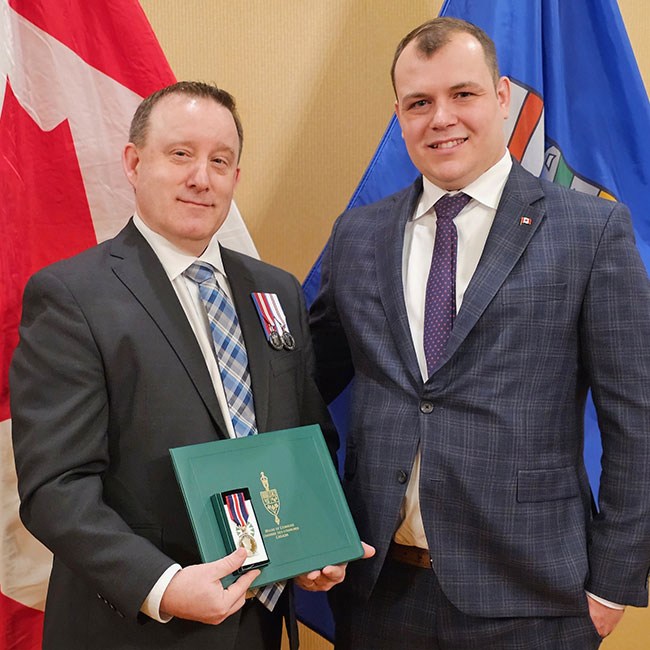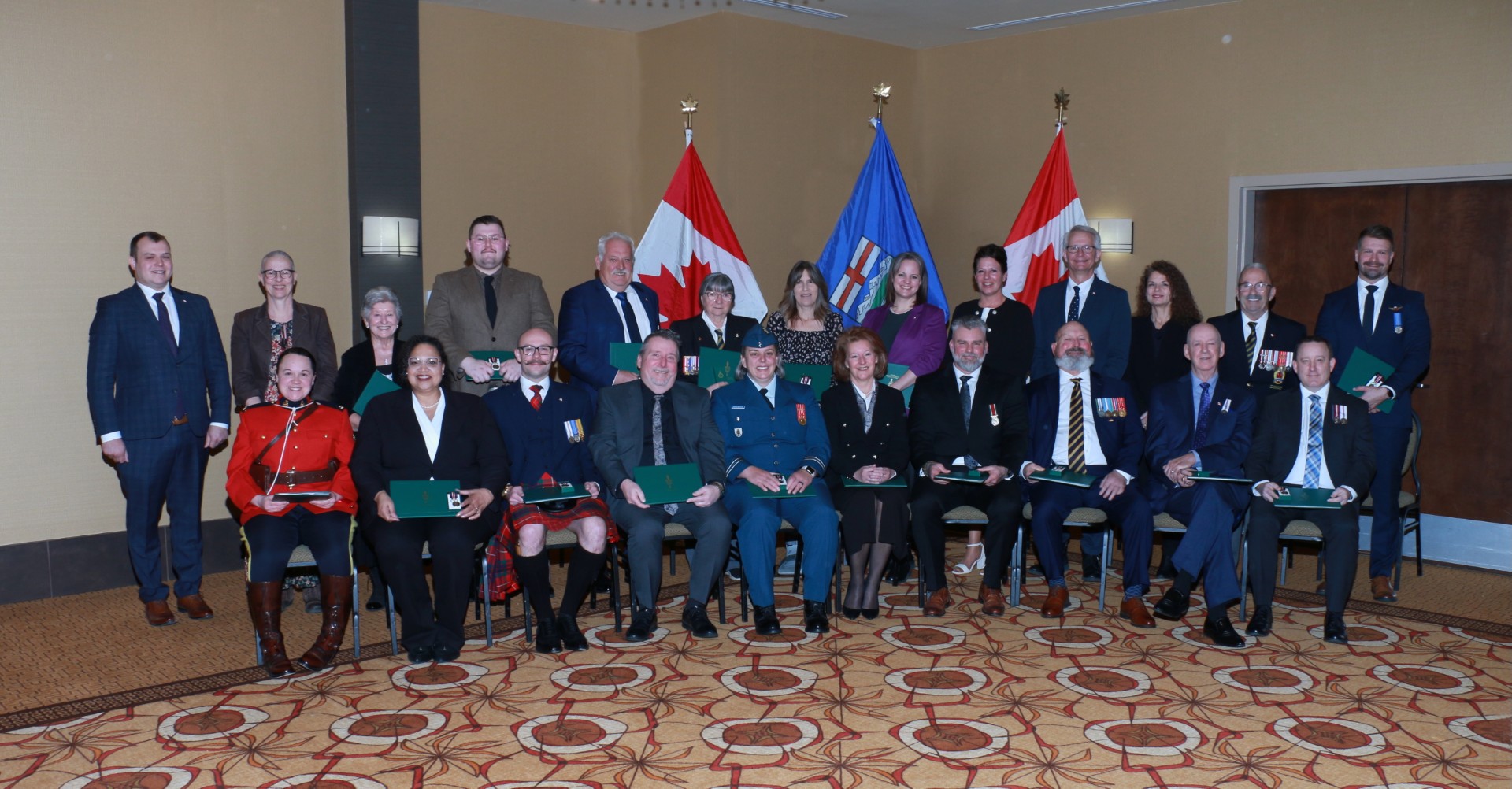Senior research scientist Dr. Jason Acker honoured with King Charles III Coronation Medal for groundbreaking cryobiology research
Monday, April 14, 2025 Alex Williams
Canadian Blood Services senior research scientist, Dr. Jason Acker, has recently been awarded the prestigious King Charles III Coronation Medal for his contributions to the fields of science, technology and innovation.

This medal was created to mark the coronation of His Majesty King Charles III. It is awarded to individuals who have made a significant contribution to Canada (or to a particular province, territory, region of, or community in, the country), or who have attained an outstanding achievement that brings credit to Canada. For Dr. Acker, who is also a professor in the department of laboratory medicine and pathology and associate vice president, research integrity support at the University of Alberta in Edmonton, this honor recognizes the groundbreaking work he has led on ice crystal growth and cryoinjury, which has revolutionized cell and tissue preservation.

Says Acker, “Every day I have the privilege of being able to work in the lab with an outstanding group of trainees, staff, scientists and clinicians at Canadian Blood Services who are committed to improving transfusion science. Being recognized with this award for the significant contributions we have made to science and innovation is really quite amazing!"
Dr. Chantale Pambrun, senior medical director of innovation and portfolio management at Canadian Blood Services, says, “Dr. Acker’s recognition with this prestigious honour highlights the exceptional calibre of research and innovation within Canadian Blood Services’ network, and the profound impact it has on the lives of Canadians.”
So, what is cryobiology and how does it relate to transfusion and/or transplantation?
Dr. Acker’s cryobiology research focuses on understanding responses of cells and other tissues to refrigeration or sub-zero storage conditions and preservation methods outside of the body (ex vivo), particularly those involving freezing and thawing.
Other terms closely related to this research include 'cryoinjury', which describes the negative impacts of low temperatures on cells, and 'cryopreservation', referring to the process of stabilizing and protecting cells that are exposed to low temperatures.
Cryobiology research applies to transfusion because blood products (including plasma, red blood cells, platelets and hematopoietic stem cells) are stored at below normal physiological temperatures to maximize their shelf life and minimize risks of bacterial growth. Some may even be frozen during manufacturing and require warming and/or thawing prior to administration in a hospital setting.
This research is important to continuously improve understanding about how the manufacturing and storage of blood cells and tissues impact their quality and effectiveness as therapeutics for transfusion and transplantation recipients.
Why or how are these findings being applied to our products and processes at Canadian Blood Services?
Dr. Acker’s research helps improve how blood products are manufactured, stored, and used at Canadian Blood Services by applying scientific and technical evidence to support innovation and best practices. In simple terms, Dr. Acker has led breakthrough research that can help to optimize the quality, safety and effectiveness of blood products, stem cells and tissues when they’re needed most.
Dr. Acker’s team has also developed better methods for evaluating the impact that blood donor factors have on the quality of cell therapeutics which has informed policies and practices around their appropriate use.
What are some of the most impactful cryobiology discoveries from recent years?
Over more than two decades, Dr. Acker’s groundbreaking research into how ice crystals damage cells when they freeze has changed the game for cryobiology. Normally, freezing can create large ice crystals that cause significant damage to cells. In the early 2000’s, Dr. Acker found ways to stop this from happening—helping frozen cells survive and stay strong. This innovative work was published in the peer-reviewed journal, Cell Transplant (2002) and even led to the creation of a patent.
Taking his research from the lab to real-world use, Dr. Acker also co-founded PanTHERA CyroSolutions where his team created special molecules that stop harmful ice from forming. This innovation has led to new commercial products that are enhancing the protection of cell-based therapeutic products around the world.
More recently, members of Dr. Acker’s lab have received funding through Canadian Blood Services’ competitive funding programs and other national funding initiatives to continue investigating a variety of cryobiology-related projects. Some of these projects include:
- Looking at preserving red blood cells with a new supercooling system;
- Considering hypothermic storage as an alternative to irradiation for for red blood cell concentrates;
- Evaluating what happens when cryopreserved red blood cell concentrates are exposed to warming; and
- Co-investigating methods to manufacture, store and deliver mitochondria to transform regenerative medicine (funded via the federal New Frontiers in Research Fund (NFRF) Transformation competition).
Read more in this selection of recent publications from Dr. Acker’s lab:
- Exposure of cryopreserved red cell concentrates to real-world transient warming events has a negligible impact on quality. Transfusion (2024).
- Ice recrystallization inhibitors enable efficient cryopreservation of induced pluripotent stem cells: A functional and transcriptomic analysis. Stem Cell Research (2024).
- Innovations in red blood cell preservation. Blood Reviews (2025).
- Variation in the osmotic characteristics of aging red blood cells: Insights for cryopreservation optimization. Cytotherapy (2025).
Whether it’s informing the optimization of best practices for blood transfusion through understanding the biological response of cells to low temperatures, or contributing to the design of new methods for long-term storage of cell-based therapeutics and tissues, Dr. Acker’s work has left a lasting mark on science, technology, and innovation—making him a fitting recipient of this royal honour.
Canadian Blood Services – Driving world-class innovation
Through discovery, development and applied research, Canadian Blood Services drives world-class innovation in blood transfusion, cellular therapy and transplantation—bringing clarity and insight to an increasingly complex healthcare future. Our dedicated research team and extended network of partners engage in exploratory and applied research to create new knowledge, inform and enhance best practices, contribute to the development of new services and technologies, and build capacity through training and collaboration. Find out more about our research impact.
The opinions reflected in this post are those of the author and do not necessarily reflect the opinions of Canadian Blood Services nor do they reflect the views of Health Canada or any other funding agency.
Related blog posts
For this instalment of “Meet the researcher”, we met with Dr. Jason Acker, a senior research scientist at Canadian Blood Services who specializes in the manufacturing and storage of blood components. “What gets me up in the morning is the knowledge that through the work of my team and my...
Centre for Innovation scientist Dr. Jason Acker was recently inducted as a Fellow of the Society for Cryobiology, a prestigious international award that recognizes individuals who have had an exemplary impact on the field of cryobiology. Congratulations to Dr. Acker, who received this award over the summer at the Society for Cryobiology’s annual meeting in San Diego.

